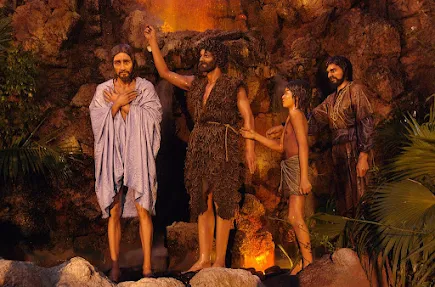Jesus’
words in Matthew 11:11–15 come in the midst of a dialogue about John the
Baptist’s role in salvation history. John had sent messengers from prison to
confirm whether Jesus was the promised Messiah. In response, Jesus not only
affirmed His messianic identity but also exalted John’s crucial role in
preparing the way for the Kingdom of God. This passage draws our attention to
John as the bridge between the Old Covenant and the New, and to the radical
nature of the Kingdom Jesus inaugurates.
The
Greatest Born of Women.
The
teaching of Jesus in Matthew 11:11 is profound and layered, touching on themes
of greatness, the nature of the Kingdom of Heaven, and the transformative power
of grace. To fully grasp the meaning, let’s explore the Greek meanings of key
terms and their theological significance.
“Born
of Women” (γεννητοῖς γυναικῶν, gennētois gynaikōn): This phrase refers to all humans born naturally,
emphasizing human limitation and the natural order. John the Baptist is
highlighted as the greatest in this category, underscoring his unparalleled
role in preparing the way for Jesus. However, the comparison to those in the
Kingdom of Heaven introduces a shift from the natural to the supernatural
order.
“Greater”
(μείζων, meizōn): The term meizōn
means “greater”in terms of rank, role, or status. Jesus acknowledges John’s
greatness, particularly his prophetic mission as the forerunner of the Messiah.
Yet, this greatness is still tied to the old covenant and the promises of the
Law and Prophets.
“Least”
(μικρότερος, mikroteros):
The word mikroteros can mean “least” in terms of size, significance, or
rank. In this context, it likely refers to someone who might seem insignificant
or unimportant in worldly terms but is part of the Kingdom of Heaven. This
juxtaposition highlights the radical values of the Kingdom, where greatness is
redefined.
“Kingdom
of Heaven” (βασιλεία τῶν οὐρανῶν, basileia tōn ouranōn): The basileia tōn ouranōn refers to the reign or
rule of God, inaugurated by Jesus. It is both a present reality manifested by
the great works of Jesus and a future fulfillment. Entrance into this Kingdom
is not based on earthly merit but on the transformative work of grace.
So,
what is the Meaning of Jesus' Teaching?
John’s
Greatness in the Old Covenant:
Jesus acknowledges John the Baptist as the greatest among those born of women.
This greatness is tied to John’s unique role as the culmination of the
prophetic tradition. He is the “Elijah who was to come” (v. 14),
bridging the gap between the old covenant and the new. However, John’s mission
is preparatory; he points to the Kingdom but does not fully participate in its
inaugurated reality through Christ.
The
Superiority of the Kingdom of Heaven:
Jesus introduces a profound paradox: even the least in the Kingdom of Heaven is
greater than John. This is not to diminish John but to highlight the
transformative power of God’s grace. Those who belong to the Kingdom experience
a new reality of intimacy with God through Jesus Christ. They are not merely
observers of the promises but participants in their fulfillment.
Who Is the Least in the Kingdom? The “least” in the Kingdom could refer to:
- Those who seem insignificant by worldly standards but are exalted in
God’s eyes (cf. Matthew 20:16, “The last will be first”).
- The humble and contrite who embrace the gift of salvation (cf.
Matthew 5:3, “Blessed are the poor in spirit”).
- Jesus Himself, who took the form of a servant and became “least” for
our sake (cf. Philippians 2:6-8).
By this radical
inversion, Jesus teaches that true greatness is not measured by human standards
but by participation in the divine life of the Kingdom.
Greatness
Redefined: This teaching challenges human
notions of greatness. John represents the pinnacle of the old order, but even
the least in the Kingdom benefits from the fullness of grace brought by Jesus.
The greatness of the Kingdom lies in the new relationship with God through
Christ, marked by forgiveness, transformation, and the indwelling of the Holy
Spirit.
To
be “greater”in the Kingdom does not mean achieving more in human terms but
living in the reality of God’s reign, which overturns worldly hierarchies. It
reminds us that humility and dependence on God are the true paths to greatness.
Humanity is definitively reconciled with God not by the blood of animal, but by
the sacrificial death of Jesus on the Cross.
What
is the Message for Us today?
Jesus’ words call us to reflect on
where we find our identity and greatness. Are we striving for recognition in
earthly terms, or are we embracing the humility and grace of the Kingdom? This
passage invites us to rejoice in the gift of being part of God’s Kingdom,
understand it as a reality available to all who respond to Jesus with faith and
openness.
In essence, the least in the Kingdom
is anyone who humbly acknowledges their dependence on God and receives His
transformative grace. In the eyes of the world, they may be small, but in God’s
Kingdom, they are truly great.
John
the Baptist is a prophet with a singular task: to prepare the people’s hearts
for the Messiah. His greatness lies in his faithfulness, his courage in calling
people to repentance, and his humility in pointing away from himself to the
Lamb of God. We find in him one of essential qualities of Prophets of God: they
are God-centered and not self-centered.
Yet,
immediately after declaring John’s greatness, Jesus makes a startling
statement: “Amen, I say to you, among those born of women there has been
none greater than John the Baptist…” This reveals a profound truth about
the Kingdom of God, it is not about earthly status, merit, or achievement but
about grace. Entry into the Kingdom is a gift, and even the humblest member of
this new reality, united with Christ, shares in a greatness that surpasses the
Old Covenant.
The
Violence of the Kingdom
The next statement about the Kingdom
being “subjected to violence” is both mysterious and powerful. Jesus paints a
picture of the Kingdom as something dynamic, not passive. From John’s time,
people have been forcefully pressing into it, some through desperate longing
for salvation, others with opposition and hostility.
On
one hand, this “violence” represents the intensity of human desire for God.
Those who recognize their need for redemption pursue the Kingdom with an
urgency that breaks through barriers of sin, fear, and doubt. This is the holy
“violence” of faith, where hearts cry out to God with an unrelenting thirst for
grace and truth.
On
the other hand, the Kingdom faces opposition. The religious authorities
resisted John and Jesus because the Kingdom challenged their systems of power
and control. Even today, the forces of darkness strive to undermine God’s work.
Yet, the Kingdom is unshakable, advancing through the courage of those who
trust in the power of God.
John
as the New Elijah
Jesus then reveals an astonishing
truth: John is the Elijah who was to come. Elijah, the fiery prophet of the Old
Testament, was expected to return as a forerunner of the Messiah (Malachi
4:5-6). By identifying John as Elijah, Jesus confirms that the long-awaited
time of fulfillment has arrived. The promises of the Law and the Prophets
converge in John’s ministry and find their culmination in Christ.
John’s role is one of selfless
preparation. Like Elijah, he calls people to repentance, turning their hearts
back to God. Yet, his mission is also one of relinquishment. He must decrease
so that Christ may increase. This is a call not just for John but for all of us,
to prepare the way for Jesus in our lives and in the world, stepping aside so
that His light may shine.
“Whoever
Has Ears, Let Them Hear”
This
phrase, often used by Jesus, is a call to spiritual attentiveness. The message
of the Kingdom requires not just hearing with our ears but understanding with
our hearts. The truths Jesus reveals are profound and transformative, but they
demand openness and faith.
What
does this passage mean for us today? First, it challenges us to recognize the
greatness of the Kingdom we are called to enter. If John, the greatest of the
prophets, stands outside the fullness of the Kingdom, how much more should we
treasure the grace of being in Christ, the King?
Second,
it invites us to embrace the “violence” of the Kingdom, not with weapons of
war, but with the relentless pursuit of God’s presence. Faith is not passive;
it is active, dynamic, and sometimes costly. It requires breaking through the
obstacles of sin, doubt, and fear to lay hold of the life God offers.
Third, it reminds us of our mission as
forerunners of Christ in the world. Like John, we are called to prepare the way
for the Lord in the hearts of others. This requires humility, courage, and a
willingness to decrease so that Christ may increase in and through us.
Finally, it offers a challenge: “Whoever
has ears, let them hear.” Are we truly listening to Jesus’ words? Do we
recognize the urgency of His call to participate in the Kingdom? Are we
prepared to surrender our own agendas and embrace the radical life of
discipleship?
Today’s
Gospel invites us to pursue God with all our hearts, to stand firm in the face
of opposition, and to prepare the way for Christ in our lives and in the world.
May we, like John, be faithful messengers of God’s grace and tireless seekers
of His Kingdom. And may we have ears to hear the voice of Jesus, calling us to
the fullness of life in Him, Amen.🙏🙏🙏











